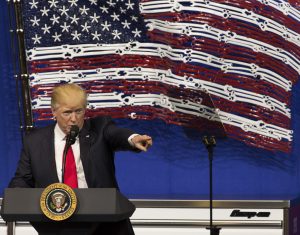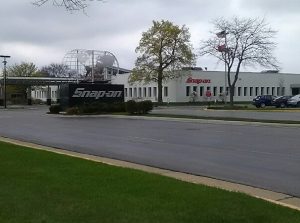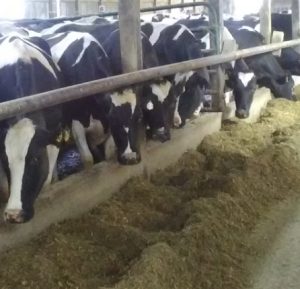Dairy industry ills commandeer Trump visit, executive order
Gregory Harutunian for Chronicle Media — April 25, 2017
President Donald Trump visited the Kenosha, Wis.-based Snap-On Tools, Inc. and announced an executive order, “Hire American, Buy American,” to assist domestic manufacturing by mandating that federal agencies seek partnerships for goods and services from within the United States. (Photo courtesy of Mark Hoffman and Milwaukee Journal-Sentinel)
The week-long activity generated by helicopter traffic, buzzing over northeastern Illinois and southeastern Wisconsin, culminated April 18, with an appearance by President Donald Trump at Kenosha’s Snap-On Tools, Inc., his first to the Dairy State since assuming office. The purpose was to announce a new executive order aimed at federal agencies supporting domestic production using a “Buy American, Hire American” theme.
Although a “period of review” will preclude any immediate action on the order, the “attitude” of the official edict aims at promoting a platform where American manufacturing carries an urgent awareness, meeting promises made on the campaign trail. The protection of jobs being relocated to another country is also addressed, along with limiting guest worker visas.
While touting the document and its implementation, another issue involving the state’s dairy industry was presented, and fully embraced by Trump.

President Donald Trump is greeted by Col. Daniel Yenchesky, left, commander of the 128th Air Refueling Wing, in Milwaukee, Wisconsin, Tuesday, April 18, 2017. He left in a helicopter for Kenosha, Wisconsin, where he made a visit to the headquarters of tool manufacturer Snap-on Inc., his first visit to Wisconsin since taking office. (Milwaukee Journal Sentinel photo by Rick Wood/RWOOD@JOURNALSENTINEL.COM
ORG XMIT: 20092043B)
“We’re going to stand up for our dairy farmers in Wisconsin … and [it] demands immediate fair trade with all of our trade partners, and that includes Canada. In Canada, some very unfair things have happened to our dairy farmers and others.”
Trump pledged that he would meet with state officials including Gov. Scott Walker, current House speaker Paul Ryan, (R-Wis.) and U.S. Sen. Ron Johnson, (R-Wis.) to come up with a solution. The National Milk Producers Federation, and the Midwest Dairy Association, covering the central states, have posted statements that acknowledge Trump’s efforts in identifying the controversy and putting trade partners on notice.
The concern evolved from Greenwood, Wis.-based Grassland Dairy, a processer of milk, sending notices of contract termination with 78 dairy farms, located in the northern portion of the state, with an effective date of May 1. The decision was based on declining markets for American milk with Canadian buyers, where the country’s officials have claimed its overproduction has basically “flooded the market,” in a global economy.

P The Snap-On Tools, Inc. in Kenosha, Wis. was the site of Donald Trump’s first visit to the dairy state. The company, located at 2801-80th Street, manufactures tools and diagnostic machinery. (Photo by Gregory Harutunian/for Chronicle Media)
The main product of Grassland Dairy is “ultra-filtered” milk, which refines the milk protein used in making cheese. While Wisconsin is one of the major cheese-production states in the country, the raw milk is still their No. 1 commodity. Dairy farmers in the state of New York have faced the same problem since last year, and have been forced to dump milk.
“It’s a problem that dairy farmers have all across the country,” said Dale Elfering, a Bristol, Wis. dairy farmer. “This is a supply-and-demand market. Most farmers will find other contracts with other places. A few of the old-timers will have to make the decision to sell out. Plain and simple, there’s a surplus of milk, and we see a swing of production every five years or so.
“Most of this has been concentrated in the northern part of the state. Supply and demand impacts all agriculture,” he said. “Some will have to go out, and it will get the supply down. We’re shipping to Canada, but their farmers are saying the same thing. They have the same problem. It’ll take new markets, or fewer cows to bring it in line.”

Dairy farms in northern Wisconsin were hit with contract terminations by Grassland Dairy Products starting May 1, as end buyers in Canada have an oversupply of milk protein used in making cheeses.
His son, Dan, noted, “That’s always been the answer for dairy farmers … more cows. Not necessarily a good thing.”
Most small farms have ceased production, or gone into corporate mergers that create larger facilities, effectively changing the approach.
In Lake County, the last family operated dairy farm, owned by the Diebold family, closed in 2014. The property had been settled in 1872. The only dairy operation remaining in the county is the Golden Oaks Farm in Wauconda. It is a corporate facility with computer-programmed milking procedures, and hired personnel.
“Most businesses diversify to survive, some can’t,” said Elfering, whose business is the sole operating dairy farm in the Bristol, Wis. area.
As for the executive order, he sees some benefit that is still unfulfilled, and promise for the future.
“Our state makes so much cheese. Fluid, or raw milk is unpasteurized and goes bad quicker than cheese or butter. With this situation, they’ve been dumping the milk in New York, for about a year now.”
Regarding the executive order signed by Trump, he sees the benefit more as a promise for the future.
“Attitude is what’s helping, even though we haven’t seen the change yet. Attitude is a big thing in life.”



